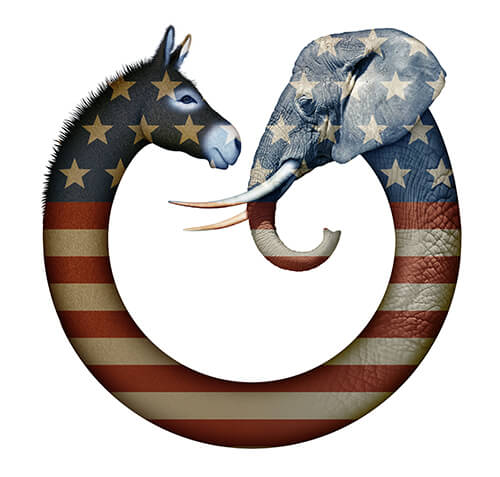Editor’s note: Head of state, chief diplomat, commander-in-chief, guardian of the economy – Americans are fixing to elect another president, so we asked Notre Dame’s in-house pundit to put the moment, the issues, the candidates and the choices in context and perspective. Bob Schmuhl’s commentary on American politics and journalism frequently appears in major print and broadcast outlets in the U.S. and abroad. His exclusive observations on the 2016 presidential election will run on magazine.nd.edu every two weeks.
UPDATE 11/14/2016: Professor Schmuhl published a first-take analysis of the election outcome and the implications of a Donald Trump presidency in today’s Irish Independent.
Election Day, like commencement at Notre Dame or any other school, marks both an end and a beginning. After all the votes are cast and counted, questions about the future collect like starlings in a stand of trees, noisily making themselves heard.
This year in particular — with partisan and intra-party divisions scalpel sharp — what might happen when the duly elected candidates take office is more mysterious than predictable. We might know the names of the winners, but the answers to a host of political riddles remain elusive in the current and unprecedented environment.

Let’s consider some of the most puzzling concerns:
How will the relationship between the new president and the new Congress develop, and what will it look like during the early months of 2017?
Will achieving common ground be a principal objective in Washington, or will we continue to see the political equivalent of civil war in the nation’s capital?
Will the overwhelmingly negative nature of the 2016 campaign make a positive agenda from either the president or Congress almost an impossibility?
Will gridlock continue on issues and initiatives — such as immigration reform, entitlement funding and trade measures — that have long-term implications and consequences?
Will American politics be less toxic after this year’s election, or will the climate become even more venomous?
Will the 45th president of the United States enjoy any kind of honeymoon period after Inauguration Day on January 20, 2017?
Will anything historic or dramatic be accomplished during the first hundred days of the new administration?
- Electing the President 2016
- Time for a Change?
- An Unconventional Party Time
- What Unites Us
- The “Un-” Election
- Battlegrounds and Bluster
- The Evil of Two Lessers
- Debatable Prospects
- Political Soul-Searching
- The View from Abroad
Will legislation — or investigation — dominate Congress’ work during 2017?
How will Republicans in the House of Representatives handle — if not resolve — their serious and persistent internal divisions?
More broadly, will Republicans across the country work to bring different viewpoints within the GOP together in a coherent way that provides some semblance of party unity?
Similarly, will Democrats bridge their own differences to become more appealing to minorities, young people and other constituencies who found last spring’s rhetoric of “political revolution” the message they wanted to rally behind and support?
Will party leaders — Democratic and Republican — come together to try to design a more logical nominating process for presidential candidates that citizens can more easily understand and follow?
Will those same leaders work on a system for selecting their nominees that engages wide participation and extends beyond the activists or party “base” supporters?
If political leaders fail to act, will the American people of whatever political viewpoint or persuasion decide on their own to seek reforms that make voting and representation as democratic and fair as possible?
Will the media do the necessary soul-searching and professional planning to come up with new journalistic approaches to campaign coverage that fully explain what candidates are proposing and portray the people seeking high office in a rounded, comprehensive fashion?
Will the media’s emphasis on audience-gathering celebrity subside after this year’s campaign, or will we continue to see contenders known for being well-known competing against more experienced yet less recognizable office-holders?
These are just some of the questions that arise from the hurly-burly, topsy-turvy 2016 election season en route to a new White House occupant and to the 115th Congress.
Looking back at everything that’s happened since March 23, 2015, when the first candidate for the presidency, Sen. Ted Cruz of Texas, announced he was seeking the Republican nomination, a keen observer at Notre Dame innocently asked the other day: “Do you think we could have a do-over Election Day?”
Though unrealistic, impossible and illegal, a sizable percentage of this year’s American body politic might well vote for a Star-Spangled Mulligan — and a completely different kind of new beginning.
Robert Schmuhl is the Walter H. Annenberg-Edmund P. Joyce Professor of American Studies and Journalism at Notre Dame. This fall he’s teaching a class on American political culture and the 2016 election.